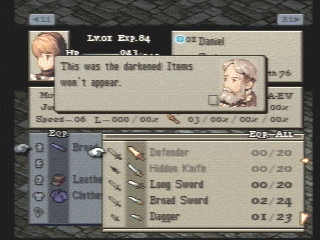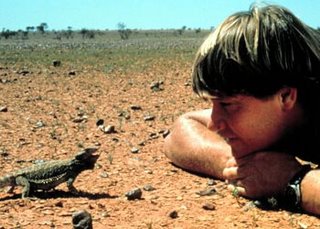"I got a good feeling!"
 I had no idea what spooning was until I was about 17. At that age, I was informed of the practice and what it meant. Nice, there’s something else learned and filed away, I thought.
I had no idea what spooning was until I was about 17. At that age, I was informed of the practice and what it meant. Nice, there’s something else learned and filed away, I thought.Though it still didn’t make, "You spoony bard!" make a damned bit of sense.
Okay, so I lied. I had heard the term “spooning,” or a derivative of it, used before. Yet it wasn’t from any of my friends or from film, music or TV. Rather, it was from a video game. Final Fantasy IV, to be exact.
The line is uttered by the character Tellah, a senile old man, to his daughter’s boyfriend Edward, a bard whom he disapproves of. I’m assuming that the writers intended Tellah to call Edward a man-whore or something of that nature, but through a combination of Nintendo censorship and a Japanese to English translation error, the bizarre cry of “You spoony bard!” emerged. Though to be fair to poor Tellah, who meets his demise attempting to cast the Meteor (rendered as "Meteo" due to the game’s memory limitations) spell and being drained by the action (seeing as how he doesn’t even have enough magic points to cast the spell), Edward is probably the crappiest character ever in a Final Fantasy title; the guy is a bard, for Christ’s sake. He’s so useless he makes Relm from Final Fantasy VI look good, and all she did was paint crap (and, in a bizarre twist of fate, could delete your save file). This was before Okami made painting as a means to violence totally awesome, by the way.
Anyway, Final Fantasy IV was a high profile game for the Super Nintendo 15 years ago, yet this didn’t mean it was free of bizarre translation errors like this one. In fact, this was common in countless video games for years.
Recently though, games have become a multi-billion dollar industry, and game developers and translators are doing more painstaking work in ensuring that game scripts make sense and are well-localized. And in theory, this is great; it lends games an air of legitimacy that will help slugs like Roger Ebert recognize them as more than toys.
Me, though, I’m going to miss the quirks that emerge from a crappy translation.
The most exposure that many have had to woeful game translations was probably the infamous "All Your Base" internet joke from about 5 or 6 years back. This joke was a video that included the American intro of the arcade game Zero Wing and a makeshift song constructed out of quotes from the intro. And that’s not even mentioning the astonishing ending.
Zero Wing, the internet phenomenon aside, is an extreme and obscure example, but even more well-known games weren’t able to escape localization quirks. While these were pretty annoying at the time and in some games succeeded in making dramatic moments laughable, in retrospect (for me at least) they only enhance the character of these games. Some examples:
Metroid – The original game in this classic Nintendo series contains a screen of introductory text that makes little to no sense. The ending isn't much better. "Mechanical life vein?" What the hell?
Ring King – An obscure wrestling game for the original Nintendo. This one actually doesn’t contain a literal translation error. Instead, it attempts to completely gloss over the fact that, between rounds, players appear to be, um…maybe it’s better if you watch the video. It may just be an unfortunate and vague animation, but judge for yourself. Looks pretty clear to me.
Final Fantasy Tactics – Zero Wing aside, this game is the mother lode of wonky translations. FFT differs from the other games listed here in that its localization woes can at times actually affect gameplay. At one point in the game, you fight the main character Ramza's brother Dycedarg, the eldest brother in the family. Well, in the “conditions for victory” that are listed in battle, you are told to do something rather contradictory. This can cause even the most seasoned player to take pause and utter a “WTF.” The game contains countless other screw-ups, such as the constant misspelling of character names (the spelling constantly goes back and forth, leading to confusion as to just who the hell the game is talking about) and basically the whole sequence of events that occurs when you send characters off on jobs with confusing objectives in pubs and taverns you come across in the game. This entails your characters being gone for a while, then returning and giving a “job report” on how things went. These reports are often gut-bustingly funny, because they all play out in EXACTLY the same way, with one character narrating a numbing story of entering a cave and finding a chest, while the other will randomly burst in with non-sequiturs. Nothing, though, can top the in-game tutorial, narrated by a character named Professor Daravon. I would say that Daravon speaks in riddles, except that these riddles are being told by a rather slow-witted individual and have no meaning behind them. The Professor talks at length about "ability" and how to use it, as well as a stirring thesis on the concept of time. Never have I seen a tutorial that only succeeded in confusing me further. It’s like the one time I actually decided to read the chapter in Honors Biology in 9th grade and got so thoroughly confused that I ended up actually doing worse on a test.
Final Fantasy VII – This one just speaks for itself.
Metal Gear – Long before the series got flashier and more cinematic than even some movies, it once had low production values and a piss-poor translation. This is apparent in an early encounter with a narcoleptic guard, and in just about every conversation with hero Snake's superior, Big Boss, who judging by these exchanges is likely the most incompetent government agent of all time. It’s sort of ironic when you consider that the production values of the Metal Gear games nowadays rival those of major Hollywood blockbusters.
The Legend of Zelda - And you thought you'd seen it all. People forget how seriously screwed up this classic game's translation actually was. It has capitalistic commands, ominous warnings, some "aw shucks" revelations, and even a thinly veiled attempt to turn impressionable children into gamblers.
So yeah, in the end, maybe this is a good thing, as people may now start to actually take games seriously.
But dammit, if that means we’re going to be deprived of comedic gold like this, I’m not sure if the legitimacy of an art form is really worth it.

